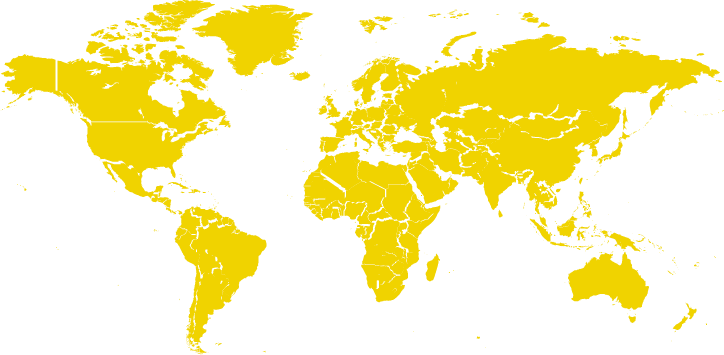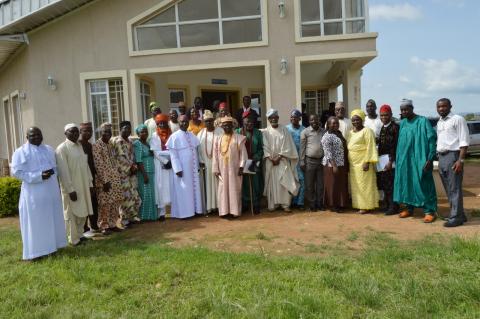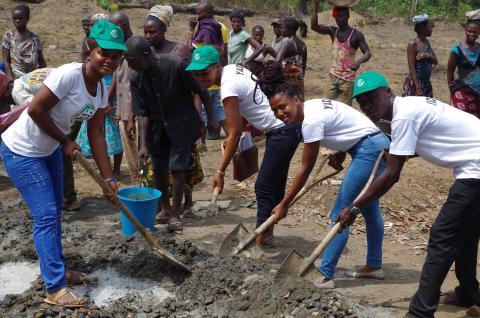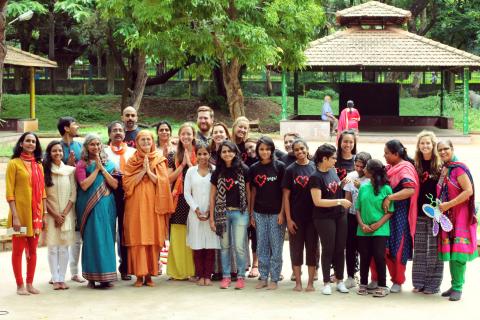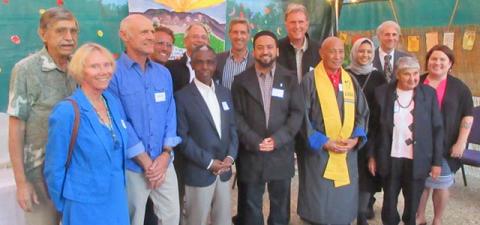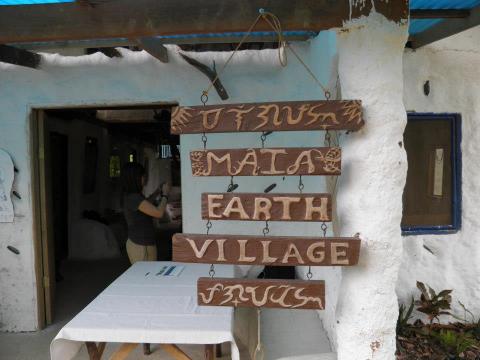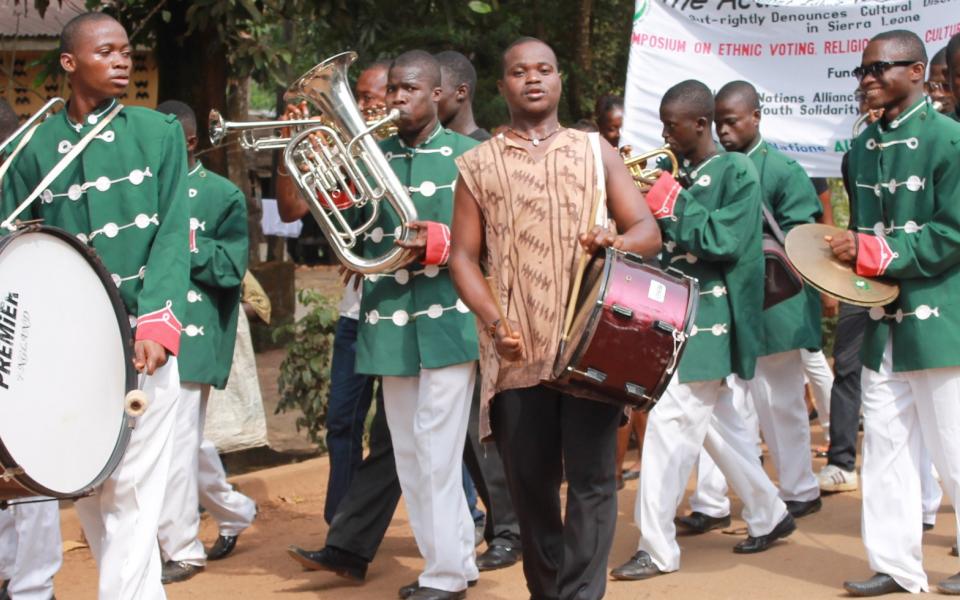
Youth in Action for Development (YAD), one of our newest cooperation circles
Six new cooperation circles were approved as URI members in October, hailing from four different regions and covering a variety of issues. Education, women and children’s empowerment, the environment, economic development and, above all, interfaith understanding, mark the key focuses of these new family members.
Our Cooperation Circle Approval Committee members were happy to receive these applications among challenging times and are particularly happy to see that Nigerians and Sierra Leoneans are working for peace and health in their countries.
For this year’s Global Oneness Day on October 24th, we celebrate these efforts as these organizations join 650 other cooperation circles around the world with the hope that, in unity, we can make a change.
AFRICA
Dialogue, Reconciliation and Peace Centre (DREP)
Dialogue, Reconciliation and Peace Centre (DREP) is a Nigeria-based registered national NGO with a head office in Jos, Plateau State. His Grace, the Most Rev. Dr. Ignatius A. Kaigama, Catholic Archbishop of Jos, President of the Catholic Bishops Conference of Nigeria and Vice Chair of the West Africa Catholic Bishops Conference founded the organization in 2011. The DREP is a diverse of community of religious leaders, traditional and community leaders, youth, women and social change activists.
The DREP Centre brings together youth, women, leaders and other grassroots members of various religious, political and ethnic leaders and groups to experience and learn together through dialogue, reconciliation and peacebuilding. They provide an opportunity to share experiences to promote trust and reconciliation that will in turn equip the participants for peacebuilding in their own communities. Some of the projects of the DREP include but not limited to: interfaith dialogue, peace education, microfinance for urban and rural women, etc. DREP is a member-based organization.
As a Cooperation Circle, DREP is aimed at proactively responding to the incessant destruction of lives and property, the polarization of Christian and Muslim settlement in Jos and the surrounding area, the ‘revenge’ mentality among youths, and the gap created by prejudice and ignorance of religion. They have been working to break the barriers between people of different ethnic, religious and cultural affiliations by encouraging them to talk openly, honestly and with respect for one another, thereby diffusing the hurt and anger they feel towards one another. Members provide a safe space for dialogue and reconciliation among diverse groups in Plateau State and beyond.
Youth in Action for Development (YAD)
Youth in Action for Development (YAD) is a registered national nonprofit with a head office in Kenema District, Sierra Leone. YAD works with youth to promote and build peace and democracy through campaigns against ethnic-based politics in order to promote gender equality, social freedom, free education, self-reliance through skill training, self-help ventures and income generation schemes, minimize violence and conflict through dialogues and sensitization campaigns.
YAD is working to ensure that education becomes a human right for everyone and that politics become detribalized and de-regionalized. They also work to advance the rights of youth, women, children and adults. Some of YAD’s projects include, but are not limited to: health, skill share, education, democracy advocacy campaigns, peace rallies, educational publications, etc. YAD works with local, national and international partners and is a member-based organization.
During these difficult times in Sierra Leona, compounded by the dreadful Ebola outbreak, YAD is striving hard to maintain its reputation in community building and development. YAD, in collaboration with its German partner, Fambul Tik e.V, has shipped 32 hospital beds with mattresses and three palettes of medical supplies to Sierra Leone. This CC is working on a second shipment of 35 beds to be delivered to various health posts in Kenema district including the epicenter in Kenema city.
MULTIREGION
Prafull Oorja
Prafull Oorja CC members, based in Bangalore, share passions for holistic practices with marginalized populations, bringing yoga, dance, art, reiki, acupressure, etc., to special needs children, rural women, NGO leaders, ethnically conflicted groups and others. They help to build capacity in the people they serve through confidence building workshops and empowerment, peacebuilding, leadership skills, physical capacity, mental capacity and more.
The organization started one year ago and was incorporated with trust status in India. The initial focus is to offer holistic practices for special needs children, primarily in rural India with members also reaching out to different populations to customize holistic practices that take into consideration the cultural practices of others. Prafull Oorja gives young people a window into other cultures, serving as a resource for a better understanding of other religious and spiritual traditions and expanding knowledge with yoga, dance, art and storytelling as methods of peacebuilding. To date, Prafull Oorja has served over 300 young people and is now expanding beyond this community. The holistic approach of Prafull Oorja works to allow young people to find a place for peace.
NORTH AMERICA
Interfaith Initiative of Santa Barbara County (IISBC)
IISBC sprung out of the Santa Barbara Foundation as an interfaith answer to affordable housing and addressing the needs of their community. They currently hold annual celebrations that inspire interfaith cooperation, understanding and activism. In 2013, IISBC signed memoranda with ECOFaith and HEAL in order to expand the scope of interfaith activism in Santa Barbara County. This consolidation has formed one strong organization that takes a focused, hands-on approach to solving habitat, energy, and sheltering issues.
This Cooperation Circle welcomes, stands with, and celebrates the major faith and spiritual traditions in the community, promoting understanding, respect, and cooperative activities while partnering with other organizations to realize our common values and goals. IISBC advocates a compassionate approach to providing human services and reducing our carbon footprint by placing social and environmental justice at the center of everyday living and decision-making.
ECOFaith, a coalition of diverse, local faith communities and individuals who are working together to lower carbon emissions and get on the Path of Sustainability and Project HEAL (Hope, Empowerment And Love). ECOFaith acknowledges that the Earth is in environmental peril and that collaborative leadership is needed to protect and preserve our living planet. HEAL’s purpose is to help identify and coordinate services for our brothers and sisters without homes in the Goleta/Noleta and Isla Vista area, especially encouraging faith congregations to engage in advocacy, issue awareness, and volunteer opportunities according to the calling and resources of each
Abbey of Hope
The Abbey of Hope is an interfaith community located in Southern Maine and Northern New England that gathers to promote, facilitate and encourage interfaith understanding through fellowship, educational opportunities, programming, retreats, pilgrimages, interfaith mission, conferences, interfaith gatherings, projects and service. The heart of the Abbey is Peace. Initially, members planned to create meet-up groups to initiate sharing sacred space, writers groups to create interfaith lectio divina, and meet-ups for shared practice such as meditation, art making, storytelling etc. In addition, CC members will be creating and facilitating interfaith retreats, developing interfaith mission trips and pilgrimages. They have developed a vision, gathered a virtual community and had their first gathering circle. They have surveyed 250 people and developed a plan for a virtual community. We will have several more meetings this fall with the plan of a full launch on January 1st 2015.
SOUTHEAST ASIA AND THE PACIFIC
Maia Earth Village
Maia Earth Village, based in Puerto Princesa City, Philippines, was formed by a shared vision of living simply in nature and the understanding of self-sustainability in the backdrop of climate change and peak. Members are from a mix of cultures and nationalities. The ecovillage hosts people from many countries and many cultural and spiritual practices. As an ecovillage, the purpose of this Cooperation Circle is to engage earth practices in sustainable peacebuilding across cultures, faiths, and beliefs, promoting the idea of shared earth stewardship to bridge people in dialogue and wise action for the earth community in the face of ongoing ecological crises.
Ecovillages, defined as “human-scale settlements, rural or urban, that strive to create models for sustainable living” have been globally recognized in modeling resilience and adaptation to ecological changes. As an ecovillage, Maia works in the backdrop of climate change and peak oil. Using ecovillage design models, members engage leaders, organizations, and communities in self-sustainability practices through permaculture gardening, appropriate technologies, waste management, natural home building, and conscious family and community living. At the core of their work is the Inner Village process, where the relationship with the earth begins with understanding the self. Thus, apart from hands-on learning, the retreat-based design of the program engages action-reflection and discovery processes through art, music, healing practices, community rituals, and nature-based activities. Maia Earth Village’s Earth Village School and Earth Camps integrate its unique Inner Village approach with Ecovillage Design Models led by GAIA Education, a global ecovillage design platform. Maia is also a member of the Global Ecovillage Network, a worldwide collective of intentional, transitional and ecological communities.
Maia Earth Village assisted in post-disaster relief in partnership with Green Relief Initiative in 2012. Maia Earth Village is also developing a children inclusive ecovillage ensign program for disaster rehabilitation in partnership under an Emergency Child Protection. Maia launched an Inner Climate Change Campaign to support the emerging global actions after the People’s Climate March in September 2014.

